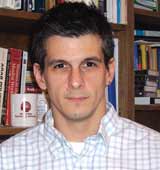|
Executive Interviews: Interview with Gary David on Multicultural Teams
March 2007
-
By Dr. Nagendra V Chowdary
 Gary David
Gary David Associate Professor of Sociology at Bentley College. 
What can be effective strategies for
managing these challenges? How do
you build and solidify a multicultural
team?
Our research is showing that firms
need to complement their formal
controls based on best practices, upto-
date technologies and rigorous
project management techniques with
somewhat informal controls that
facilitate virtual socialization, finding
common grounds, recognizing social
clues in work communications and
reciprocating in a timely manner.
While companies have emphasized
knowledge management (often
through technological and processoriented
interventions),more
|
|
attention needs to be given to
relationship management (achieved
through an awareness of social
relationships opportunities
throughout the workday). In other
words, management needs to invest
in the social side of work. Of course,
how you do it virtually is the ultimate
challenge, and what we have been
focusing on in our research. From your research, is there any
evidence to suggest that a particular
type of managers (may be based on
nationalities, type of personality,
educational background, etc.) would
be better suitable for managing
multicultural teams?
During our Interviews of managers
and workers in US, Ireland and India,
we both felt that in every group we
could identify people who will be
effective in working in global virtual
teams and can be groomed for
leadership. Some of the key
characteristics of these people were
that (1) they were comfortable in
engaging in small talk, (2) were aware
of some of the pop culture of their
team members, and (3) were usually
the spokesperson for the group. We
also observed that successful leaders
in this global phenomenon were
social brokers, comfortable in
traveling abroad and skilled in
performing everyday ethnography. It
is not always the person who is the
most technologically sound or
professionally trained, but the person
who ismost at ease at engaging in and
facilitating social interactions with
and between team members. Whats your advice to managers
managingmulticultural teams?
We have created a training programto
help workers and managers with
virtual workplace community
development, relationship
management, and globally distributed
collaboration. In this program, we
instruct and emphasize the following:
- While national cultural differences
might matter, it is important to
understand how they matter in the
daily interactions between virtual
teammembers.Thismeans develop
an awareness of the everyday
elements that impactwork(whatwe
call doing Everyday Ethnography).
- Identify the best practices within
your own organization, including
those who are adept at facilitating
social relationships face to face
and virtually. Then you can
integrate these practices more
explicitly in your organization.
- For a team to be truly
collaborative, they must be equal
members. This means that
projects should not just be
managed from on one site or
another. Team members must be
accountable to one another, and
distributed sites need to have the
opportunity to innovate and
evolve up the organizations value
chain.
1.
Team Building Case Study
2. ICMR
Case Collection
3.
Case Study Volumes
|
The Interview was conducted by Dr. Nagendra V Chowdary, Consulting Editor, Effective
Executive and Dean, IBSCDC, Hyderabad. This Interview was originally published in Effective Executive, IUP, March 2007. Copyright © March 2007, IBSCDC
No part of this publication may be copied, reproduced or distributed, stored in a retrieval
system, used in a spreadsheet, or transmitted in any form or medium electronic,
mechanical, photocopying, recording, or otherwise without the permission of IBSCDC. |
